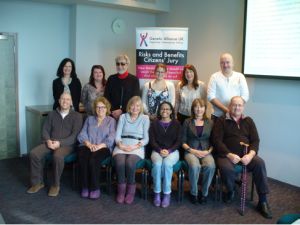BUS was recently invited to participate in a debate on ‘How Can We Improve Earlier Access to Medicines for Patients in the UK?’ The debate was set up by Les Halpin, a very inspirational man who founded EMPOWER: Access To Medicine following his diagnosis of Motor Neurone Disease and realising that there were few medications licensed for this disease and that if research was undertaken on new medications, it would take many months or even years before the medicine was available for use.
This debate was held at the King’s Fund in London and brought together a range of leading and influential individuals including:
▪ Lois Rogers, leading health journalist and contributor to publications including The Sunday Times, The Economist and New Statesman and consultant to the Department of Health and other government agencies
▪ Dr Richard Barker, Director of the Centre for Accelerating Medical Innovations, Oxford University and former head of the ABPI
▪ Yogi Amin, human rights and medical ethics lawyer, Irwin Mitchell
▪ Alastair Kent, Director of Genetic Alliance UK
▪ Professor Sir Peter Lachmann, Emeritus Sheila Joan Smith Professor of Immunology in the University of Cambridge and a fellow of Christ’s College
BUS has received a thank you letter for its input into the debate, which is copied below and gives information on how you can become involved in this campaign and how you can access the film of Les Halpin talking about the campaign:
Empower: Access to Medicine
I would like to personally thank you for attending the Empower: Access to Medicine debate at the King’s Fund last week. We appreciate your interest in and support for such an important subject.
I am very heartened by the response to this campaign. Whilst there are many separate discussions that are taking place on this issue, my main interest is in the voice of the patient which I believe has been least heard to date.
I am therefore delighted that patient advocacy groups from around the country have responded so positively. My key aim moving forward will be to support a unified patient voice so we can together deliver much needed change.
A longer and more comprehensive version of the film that was shown at the debate is now available online at www.accesstomedicine.co.uk and I would urge you to share this with colleagues and networks that may also be interested.
You can also join the conversation online through Twitter – find us on @empoweratm
The Empower team is now defining its campaign objectives as we continue to reach out to interested individuals and groups and we will keep you informed of our next steps.
In the meantime, if you have any questions or suggestions about the campaign, please contact Karen, James or Sarah at JBP on 0203 267 0074.
Yours sincerely,
Les Halpin
Founder, Empower: Access to Medicine
